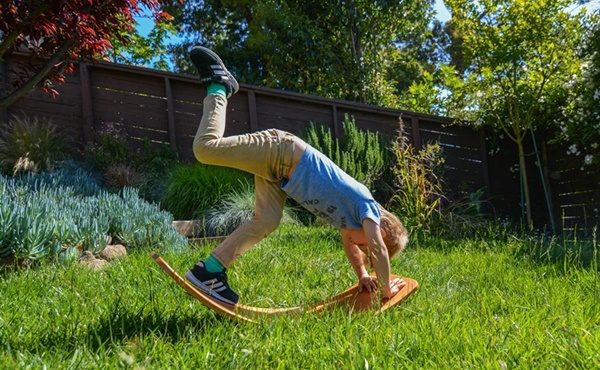“Our business began as the personal passion of our founder, John Daniels,” says co-owner and managing director, Andrew McGregor.
“For many years he helped small family owned handicraft manufacturers in rural Sri Lanka bring their products to market. The same commitment to high-quality, ethically sourced, safe and creative products remains at the heart of our business two decades later.
“We look forward to capitalising on the growing backlash against the amount of device screen time children are experiencing. We believe parents and carers see value in children discovering some of life’s simpler, creative pleasures. The popularity of the Kinderfeets Kinderboard is case in point. Sales for this deceptively simple toy have exceeded all expectations in 2018.”
Worldwide, the wooden toy category in particular is currently growing 12 per cent annually.
“This is almost three times the rate of the overall toy industry,” he explains. “This trend reinforces our view that consumers are increasingly unhappy with the environmental and economic impact of plastic and licenced products.
“Artiwood remains focused on sourcing and supplying quality toys made from natural materials. However, we’re increasingly concerned that major players entering the market with low-quality options will ultimately undermine this category’s reputation for quality and durability.”
This year has been a strong year of progress for Artiwood with new Portuguese cork toy range from Elou as well as new toys from New Classic Toys, Indigo Jamm and Kinderfeets doing really well. Also, the new Apple Park soft dolls and Kozy Koala from Organic Farm Buddies have been the surprise hit of 2018.
“We look for brands and products that reflect our eco-friendly philosophy. This means we avoid plastic as a primary material in any of our products. We’re also quick to reject any supplier with questionable quality control or dubious manufacturing practices. We’re ultimately looking for brands that offer quality, durability and commitment to environmentally friendly practices.”
Artiwood’s new WeDo Games have been well received. WeDo Games encourages children to rediscover the joy of imaginative play and quality family time. “We also love the fact that they’re created by an Australian family. We’re avid supporters of other Australian companies including The Freckled Frog, Kidstart and AndZee.”
McGregor adds that when it comes to quality control, Artiwood’s suppliers strive to ensure that every toy coming out of the factory is world-class rather than accepting that a certain percentage will result in replacement under warranty.
“For example, Indigo Jamm and I’m Toy manage their factories directly and won’t substitute the materials used in production for something less reliable. Plywood costs can be reduced by choosing cheaper, less durable timber species; using fewer, thinner planks and lower quality resins; or accepting it from questionable sources. Our suppliers refuse to cut corners that reduce the cost of their product and compromise its quality.”
Top tips for retailers:
• Ensure you have an active online strategy in place; even if this means nothing more than building your own social media following.
• Look for unique product that offer quality at a reasonable price. Don’t be fooled by the cheapest option. Significantly lower prices will always come at the expense of quality in all of the categories we focus on. For example, Apple Park stuffs its toys with natural corn fibre or organic cotton. Cheaper organic cotton alternatives fill their toys with hidden polyester.
Meet Artiwood Educational Toys at stand 3Y12 at the upcoming AGHA Sydney Gift Fair at Sydney Olympic Park (23-26 February 2019). Entry is free for industry professionals. Visit sydneygift.com.au for more information and to find out how you can attend this trade event.







